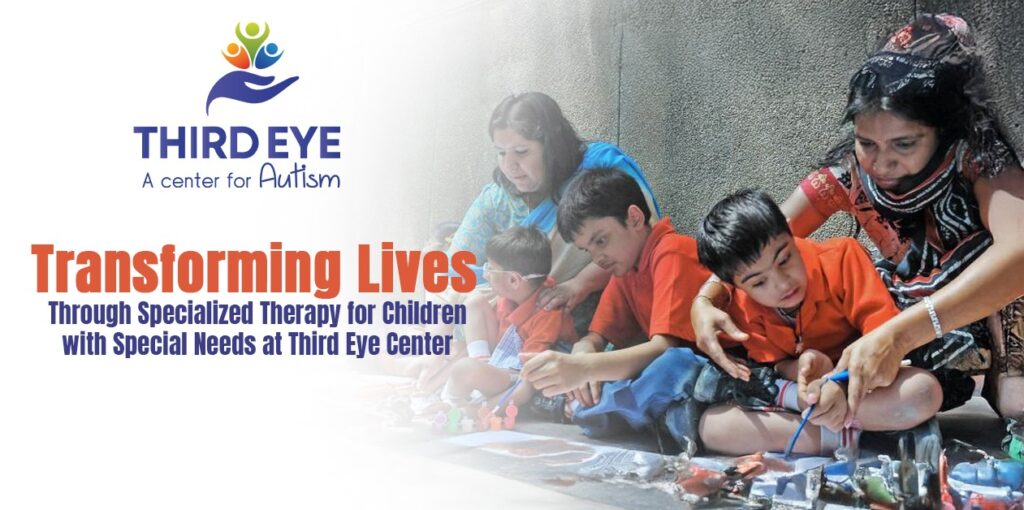
In children with special needs, Third Eye Center provides the appropriate guidance, care and therapy that can open opportunities and enhance their lives. Our task is straightforward yet deep: empower such children by way of special therapies that promote development and enhance their confidence.
Table of Contents
ToggleUnderstanding the Therapeutic Expertise
Children with special needs experience different challenges in the spheres of communication, behaviour, learning and social interaction. These are highly daunting challenges for the child and for the family. However, this kind of therapy presents a systemized way of addressing such challenges in a very effective manner.
Third Eye Center appreciates the importance of early intervention. The earlier we begin, the bigger the difference in a child’s development and later life.
What Is Different about Specialized Therapy?
Unlike generic programs, specialized therapy focuses on:
- Personalized care
- Developmental targets
- Evidence-based method
- Empathetic, skilled therapists
This also allows for a non-judgmental atmosphere in which kids are not judged and can work at their own pace.
Our Main Therapy Programs
Autism Assistance and Intervention
Each child receives a personalized plan designed by skilled professionals who work in close co-ordination with family members for tracking the improvement and making appropriate adjustments in strategies. Our treatment program for autism targets:
- Social interactions and communications
- Promoting self-help skills
- Reduction of maladaptive or compulsive behaviours
- Strengthening of cognitive development
Speech Therapy for Effective Communication
Speech disorders are common in the special needs child. Our speech therapy addresses:
- Mixing verbal and non-verbal communications
- Reading comprehension
- Greater expressiveness and clarity
- Developing meaningful communication
Our skilled therapists make learning enjoyable and effective by using fun activities and interactive resources.
ABA and Behavioural Therapy
Applied Behaviour Analysis (ABA) and Behavioural Therapy underlie much of the methods of our interventions. Therapies embark upon:
- Target and address problematic behaviour
- Teach positive reinforcement techniques
- Encourage development of skills by deliberate actions
- Accommodate the child in healthy manners in the environment
A Holistic Framework for Development
Third Eye Center therapy doesn’t stop at the clinical level. Here, the concern is for the overall development of a child:
- Emotional support: Assisting children in acquiring self-esteem and resilience
- Family engagement: Parent support and training at home
- Social inclusion: Enabling participation in group activity and interaction with one’s peers
Our method ensures the child is not merely learning in a vacuum but is assisted in preparing for real world interaction and living skills.
Why Early Intervention Matters
Studies repeatedly prove the efficacy of early intervention in achieving better outcomes. Early identification of trouble and initiating therapy increase the chances for kids of:
- Attaining developmental milestones
- Acquiring self-care skills
- Succeeding in school and life
Third Eye Center addresses early intervention and treatment for autism because we understand the powerful developmental window of opportunities in early childhood.
FAQs
- At what age can a child start therapy at Third Eye Center?
- Treatment should start very early as soon as possible, usually at the point developmental delay or behavioural issues are first observed.
- How is a therapy plan developed for the child?
- Depending upon the child’s individualized requirements, a specific plan of therapy is prepared along with measurable objectives and routine check-up assessments.
- Is continuation of online therapy feasible?
- Yes, Third Eye Center also offers online behavioural support and speech therapy sessions for individuals unable to appear in person, offering constant progression and convenience.
- How does the parent participate in the therapeutic process?
- We give training and materials to parents so they can support the child’s development at home and carry the benefits of the therapy in their daily life.
- How do you assess the child’s progression during therapy?
- We assess progression by observing the child through routine evaluation, observation reports and milestone lists.
Conclusion
Third Eye Center thrives in the belief of making a difference in children’s lives. With highly-specialized therapy, customized care and a whole-life care approach, we work towards a child’s independence, confidence and happiness.
At Third Eye Center, our specialized therapy programs are designed to unlock potential, break barriers and inspire every child with special needs to thrive in life. Together, we walk the path of growth, resilience and hope. To know more, refer 5 Common Types of Therapy: What is Best for Autism
